#evolutionary progress
Explore tagged Tumblr posts
Text
Unleashing the Power of Imagination: Two Pathways to Innovation & Inspiration
The human mind is a vast landscape, capable of creating and discovering wonders beyond imagination. Within this mental realm, two distinct forms of imagination operate, each contributing uniquely to human ingenuity and creativity. These forms, known as “synthetic imagination” and “creative imagination,” hold the key to unlocking innovation and inspiration. In this blog, we embark on a journey to…

View On WordPress
#boundless creativity#bridging knowledge#cosmic wisdom#creative imagination#evolutionary progress#ideas that soar#imagination#imagination unleashed#imagination&039;s dance#infinite inspiration#innovative solutions#mindfulness#power of imagination#problem-solving#quick tips on imagination#synthetic imagination#thought exploration#visionary insights
0 notes
Text
My Brain: Just a quick fyi, we're so physically and mentally exhausted that I will bleed right out of your ears at the slightest provocation.
Me: Ok, noted. Let's just go to sleep.
My Brain: I cannot even believe you would suggest something so utterly preposterous.
#neurodivergent#neurodivergent memes#actually autistic#audhd#adhd#sensory overload#overstimulated#conversations with my brain#shitposting#shitpost#Unbelievable that my nervous system is a marvel of evolutionary progress
279 notes
·
View notes
Text


#kirlia#no idea what kind of an angle this is#this evolutionary line in general is a strange progression. to me#is this the weird girl pokémon? it goes from like#quiet girl who wants nobody to see her face to being confident and out there and ballerina and whatever#to overcompensate to back to being modest and like. academic. am i projecting on them??#like i feel like. i feel like i'm onto something
78 notes
·
View notes
Note
im curious as to about how long each of your pieces takes?? it took me two class periods to be satisfied with the pinch pot we just made in ceramics class (though that’s probably also because im very much a perfectionist) so i can’t imagine how long a whole critter would take
it really depends!! some of them (unpainted, simple shapes) take as little as five minutes; some of them (large, complex shapes with very detailed painting) take as much as 10 hours.
I have gotten way faster over the years, though, so don't think I'm just some natural genius! the skills of sculpting build on each other. Just last year it took me three hours to make a simple fox, and now I can bust out a really nice fox (with toe beans!) in two hours. it just takes time and repetition to get there <3
and hey congrats on being in a ceramics class!! I hope you have fun with it!! If you like critters, I recommend stealing some of the clay and making some kind of toadish blob out of it and firing it in the kiln, as long as your studio masters won't get mad about it. the joy of making a lumpy little guy is unmatched.
examples of sculpture + time counts below the cut!
Little guys like this tiny cicada, which is a design I've done so many times that I can make them on autopilot, are in the 5-15 minutes range to sculpt. bunnies, chickens, wizards, and mini-cats are like that for me too!

but if I add the time it takes to paint them, even simple sculptures can end up taking much more time—for instance, this starry chicken took only five minutes to make but about an hour to paint.
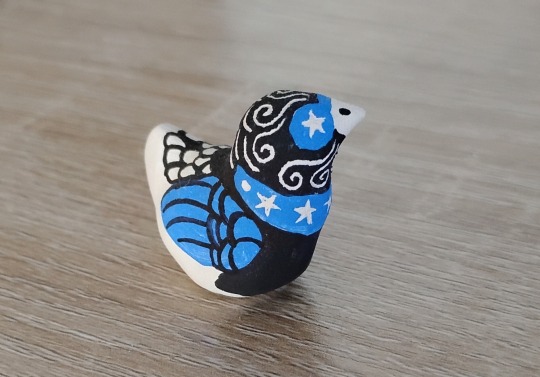
then when you get into the more complex shapes, those can take a lot of time—this anthro coyote took me 3 hours to sculpt because it was a complex shape AND I was unfamiliar with making anthros so I was learning as I went:

and when you add complex designs to complex sculptures, you end up with projects like this peach-tree bear, which took three hours to make and five hours to paint, so that's eight hours in one sculpture:

and eight hours is about my limit for sculptures I'm going to sell. BUT. when I'm making things for myself, I'm willing to spend even MORE time on them to make them perfect for my own tastes. I tend to spend the most time on fanart sculptures—it takes a lot more time to make a sculpture perfectly on-model to a pre-existing character than it does to make up a whole new thing. So the sculpture that has taken me the most time so far in this batch is this JoJo's Bizarre Adventure fanart sculpture, Star Platinum:

three hours to make the body, seven hours to paint him—Star has taken me ten hours total so far!!
#ceramics asks#work in progress#I'm currently trying to adjust my price scale to the time it takes to make these things—it's going to be a very wide range lol#cicadas and simples and suchlike will still be only 5-10 dollars#but for the 6+-hour ones.... a price over 100 dollars would only be fair for my time and skill#ok and while I'm thinking about it: shoutout to willow aka @moldspace on tumblr for her zine ''how to evolve''#I've been embracing their lessons of repetition and evolution in my ceramics this year and the improvement to my skill is MASSIVE#I now have several really really wonderful runs (evolutionary lines?) of similar-but-different sculptures due to How To Evolve#and that is just delightful#ANYWAY <3333#two class periods to make a good pinch pot is so valid!!! I don't do a lot of drinking vessels so it would probably take me that long too#@yote thank you for the question! it was a great question and a lot of fun to answer :3
22 notes
·
View notes
Text
The Philosophy of Evolution
The philosophy of evolution explores the implications of evolutionary theory for understanding life, human nature, morality, and knowledge. It intersects with various philosophical disciplines, including metaphysics, epistemology, ethics, and the philosophy of science. By examining evolution through a philosophical lens, thinkers address questions about purpose, progress, morality, and the role of chance in shaping the natural world.
1. Metaphysics and Evolution
Naturalism: Evolution supports a naturalistic worldview where life and its complexity arise from natural processes without invoking supernatural explanations. It suggests that life evolves according to the laws of nature, without inherent design or purpose, challenging traditional metaphysical views of teleology (the belief that nature has intrinsic purposes or goals).
Reductionism vs. Holism: A key metaphysical question concerns whether evolution can be fully explained through reductionism (breaking down biological phenomena into smaller parts, like genes and molecules) or whether a more holistic approach, considering whole systems or species, is required to understand evolutionary processes.
Emergence: Evolution also brings up the idea of emergence, where new properties (such as consciousness) arise from complex systems that cannot be predicted by studying individual components. Evolution highlights how simple processes can lead to the development of more complex structures, such as life and intelligence.
2. Epistemology and Evolution
Evolutionary Epistemology: This branch of philosophy examines how evolutionary theory influences our understanding of knowledge itself. It suggests that human cognitive faculties evolved to help us survive rather than to discover absolute truth, which raises questions about the reliability and limits of human knowledge. Charles Darwin himself pondered whether human reason, evolved for survival, could fully grasp the ultimate truths of the universe.
Adaptive Knowledge: Some evolutionary epistemologists argue that knowledge is adaptive, meaning that our beliefs and perceptions are shaped by natural selection to be useful for survival, even if they are not necessarily "true" in an objective sense. This leads to debates about truth versus usefulness in our understanding of the world.
Problem of Skepticism: If our cognitive faculties evolved for survival rather than truth, this raises the problem of skepticism: How can we trust that our beliefs about the world, especially abstract scientific or philosophical beliefs, are reliable? This remains a significant philosophical issue related to evolution.
3. Ethics and Evolution
Evolutionary Ethics: Evolutionary theory has influenced the development of evolutionary ethics, which seeks to explain the origins of moral behavior in terms of evolutionary processes. According to this view, human morality and altruism may have evolved because they were beneficial for social cooperation and group survival.
Moral Relativism vs. Objectivism: Evolutionary ethics raises questions about whether morality is relative (based on adaptive needs that change over time) or objective (based on unchanging moral truths). Some philosophers argue that if morality is a product of evolution, it may lack objective grounding, while others suggest that evolution reveals fundamental moral principles that enhance survival.
Altruism and Self-Interest: Evolutionary biology also explores the tension between self-interest and altruism. Theories like kin selection and reciprocal altruism attempt to explain how seemingly selfless behaviors can evolve in organisms by benefiting related individuals or by fostering cooperation that indirectly benefits the actor.
4. Teleology and Progress
Non-Teleological Evolution: One of the key shifts brought about by Darwin’s theory of evolution was the rejection of teleology (the idea that nature has an intrinsic purpose or end goal). In contrast to earlier philosophical views, such as those of Aristotle, Darwinian evolution is non-teleological, meaning that life evolves through natural selection without any predetermined direction or final purpose.
Evolution and Progress: Philosophers debate whether evolution implies progress. While evolution leads to the development of more complex life forms, it is driven by random mutations and environmental pressures rather than an inherent drive toward improvement. Some argue that the notion of progress in evolution is a cultural projection rather than a scientific reality.
5. Human Nature and Evolution
Determinism and Free Will: Evolutionary theory raises questions about free will and determinism. If human behavior is shaped by genetic and environmental factors, to what extent do individuals have control over their actions? This leads to debates about the role of biology in determining human behavior and the possibility of moral responsibility.
Human Exceptionalism: Traditional views of human nature often emphasize the unique status of humans in the natural world. Evolution challenges this by placing humans within the continuum of animal life, suggesting that our traits, including language, intelligence, and culture, evolved from earlier species. This perspective calls into question notions of human exceptionalism and anthropocentrism (the belief that humans are the central or most important species).
Consciousness and Evolution: Philosophers also explore how evolution accounts for consciousness and subjective experience. The emergence of conscious awareness in humans and other animals presents a major challenge to evolutionary explanations, as it is not yet clear how conscious experience enhances survival in a way that can be selected for by natural processes.
6. Philosophy of Science and Evolution
Evolution as a Scientific Paradigm: The philosophy of science examines how evolutionary theory functions as a scientific paradigm. Since Charles Darwin's On the Origin of Species, evolution has become the dominant framework for understanding biology, but philosophers explore how this paradigm influences scientific methodology, the interpretation of data, and the nature of scientific explanation.
Falsifiability: Evolutionary theory has been scrutinized by philosophers like Karl Popper, who initially questioned its falsifiability (whether it can be empirically tested and potentially disproved). While Popper later revised his view, debates continue over how evolutionary theory fits within the framework of scientific inquiry.
Intelligent Design and Evolution: The debate between evolution and intelligent design continues in philosophical and public discourse. Proponents of intelligent design argue that certain features of the natural world exhibit complexity that cannot be explained by evolution alone and must involve a guiding intelligence. Philosophers examine whether this critique holds scientific validity or if it relies on unscientific assumptions.
7. Existential Implications of Evolution
Evolution and Meaning: For some philosophers, evolution challenges traditional notions of meaning and purpose in life. If humans are the product of random mutations and natural selection, rather than divine or purposeful creation, then what is the basis for human meaning? This existential question leads to varying responses, from nihilism (the belief that life lacks inherent meaning) to humanism (the belief that humans can create meaning through their actions and relationships).
Existential Anxiety: The idea that life evolved through a blind, purposeless process can evoke existential anxiety, as it challenges comforting beliefs about human significance and destiny. This leads to philosophical exploration of how individuals and societies can find meaning and value in a world shaped by evolutionary processes.
8. Social and Cultural Evolution
Cultural Evolution: Beyond biological evolution, philosophers explore how cultural practices, languages, and social norms evolve over time. Cultural evolution operates through different mechanisms than biological evolution, such as imitation, learning, and social transmission. Philosophers debate whether cultural evolution follows Darwinian principles or whether it requires a separate framework.
Social Darwinism: The misuse of evolutionary theory to justify social hierarchies and inequalities is known as Social Darwinism. This ideology applies the concept of "survival of the fittest" to human societies, often in a distorted way. Philosophers critically analyze the ethical and social implications of applying evolutionary ideas to human behavior and society, rejecting these misinterpretations in favor of a more nuanced understanding of evolution’s influence on culture.
The philosophy of evolution engages with profound questions about life, knowledge, morality, and human nature, arising from the theory of evolution. It examines the role of natural processes in shaping not only biological entities but also our understanding of knowledge, ethics, and meaning. By challenging traditional metaphysical and teleological views, evolution encourages a naturalistic and dynamic view of the world, while also raising new philosophical challenges, particularly regarding the nature of humanity, morality, and knowledge.
#philosophy#epistemology#knowledge#learning#education#chatgpt#ontology#metaphysics#Philosophy of Evolution#Naturalism#Evolutionary Epistemology#Evolutionary Ethics#Human Nature and Evolution#Teleology in Evolution#Evolution and Progress#Cultural Evolution#Existentialism and Evolution#Philosophy of Science
4 notes
·
View notes
Text
i love when the weed makes you so extestential it makes you think of how many times the universe has started and died and restarted again, and how many other universes there actually are
and i dont mean multiverse theory. i mean entirely separate universes. from a far enough distance, our own universe really would be a cell.
just like how you have billions of separate cells in your body, there must be separate universes existing right now that do not actually mirror our own.
#hot take but i dont buy into the multiverse theory at all#i actually did believe in alternate universes until i heard about string theory and the multiverse theories in general#the idea that there must be a universe that exists were theres a person exactly like you is outrageously dumb#there are other universes but they could never mirror our own and any similarities between us would be purely coincidental#it's more likely theyd be completely different because the chances of everything happening the exact same as it has on earth#for 4 billion years; the exact same geological events and evolutionary progress and societal development#nope. not sorry. it literally cant be replicated 1:1
4 notes
·
View notes
Text

7 notes
·
View notes
Text
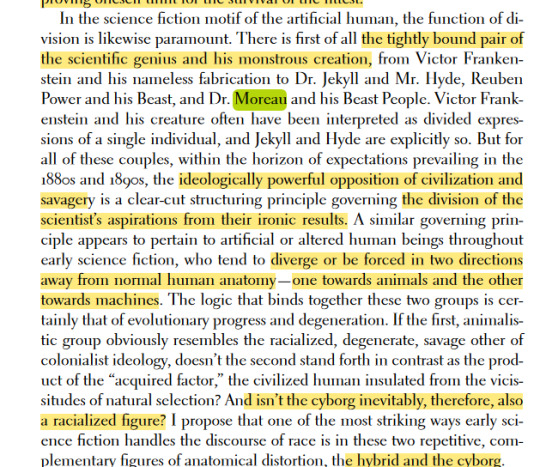
HYBRID-CYBORG DUALISM IN ONE BEING MY BELOVED
#through being made a cyborg in the aim of evolutionary progress#he becomes the very enslaved beast he's been told he was all his life#like the way the hybrid is a metaphor for the colonized subject only ever half-civilized and unevolved#closer to animal than to the colonial standards of man#and anakin all his life striving for the status of humanity. of beyond. greater than humanity.#an escape from the so-called servility of his own nature#and the way palpatine offers him that by literally mutilating him and grafting animal parts onto his body. rendering him a forever slave.#but he is indeed beyond human. more powerful. beyond the confines and limits of human strength and longevity and failibility#does he know? does he realize what he's been made into? Or is it just everyone else who can see it#but it doesn't matter what they see because now its only him and his master for the very rest of time
3 notes
·
View notes
Text
our humanity as Australian Aboriginal people has been questioned vigorously ever since whitefella came to our fucking lands and i'm going to be honest i don't give a fucking shit if your questions about Aboriginal people are purely from a scientific evolutionary standpoint: asking how or why Aboriginal people are considered to be Homo sapiens is the most racist dogshit way you could ever fucking ask your stupid question. As if us Aboriginal people don't have to deal with racist cunts saying that we're extinct or that we're not as evolved as everyone else because we never "progressed" past a certain point or some shit (as if "progression" was some how necessary for us to support our communities and live our lives the way we wanted to). it is the most tone-deaf racist fucking dumb shit i have ever heard. i am now demanding that non-Aboriginal people actually read the many many pdfs and articles that are out there, made by Aboriginal people and by different Australian government bodies about how to work with or communicate with Aboriginal people and what is/is not allowed to be asked and other BASIC FUCKING INFORMATION ABOUT ABORIGINAL PEOPLE because you whitefella are acting so out of fucking pocket that i truly believe that you need to read this shit so you actually start acting respectful when it comes to Aboriginal issues and you know HOW to actually talk about these issues without talking over us or being a shitcunt about it. and yeah one of the PDF's is 51 pages long. suck it up and read the whole thing and don't complain about it to me.
6K notes
·
View notes
Text
A deeper understand and Akashic Records"Exploring the Depths of Self: A Comprehensive Guide to the Akashic Record"Record"
In recent times, the concept of Akashic records has surged to the forefront of spiritual exploration and has captured the collective imagination. These mystic ledgers are thought to contain all knowledge of human experience and the cosmos, encoded in a non-physical plane of existence known as the astral plane. The allure of accessing such profound universal truths has drawn many individuals to…

View On WordPress
#- Akashic record reader#- Anxious minds#- Astral plane#- Authentic selves#- Collective imagination#- Comfort#- Consciousness#- Cosmos#- Evolutionary progress#- Future#- Guidance#- Human experience#- Intermediaries#- Life objectives#- Mystic ledgers#- Negative energies#- Past#- Personal development#- Personal growth#- Positive vibrations#- Potential#- Present#- Profound healing#- Reassurance#- Security#- Self-awareness#- Self-discovery#- Self-exploration#- Skilled practitioner#- Soul journey
0 notes
Note
For the Reverse Unpopular Opinion meme, Lamarckism!
(This is an excellent ask.)
Lamarck got done a bit dirty by the textbooks, as one so often is. He's billed as the guy who articulated an evolutionary theory of inherited characteristics, inevitably set up as an opponent made of straw for Darwin to knock down. The example I recall my own teachers using in grade school was the idea that a giraffe would strain to reach the highest branches of a tree, and as a result, its offspring would be born with slightly longer necks. Ha-ha-ha, isn't-that-silly, isn't natural selection so much more sensible?
But the thing is, this wasn't his idea, not even close. People have been running with ideas like that since antiquity at least. What Lamarck did was to systematize that claim, in the context of a wider and much more interesting theory.
Lamarck was born in to an era where natural philosophy was slowly giving way to Baconian science in the modern sense- that strange, eighteenth century, the one caught in an uneasy tension between Newton the alchemist and Darwin the naturalist. This is the century of Ben Franklin and his key and his kite, and the awed discovery that this "electricity" business was somehow involved in living organisms- the discovery that paved the way for Shelley's Frankenstein. This was the era when alchemy was fighting its last desperate battles with chemistry, when the division between 'organic' and 'inorganic' chemistry was fundamental- the first synthesis of organic molecules in the laboratory wouldn't occur until 1828, the year before Lamarck's death. We do not have atoms, not yet. Mendel and genetics are still more than a century away; we won't even have cells for another half-century or more.
Lamarck stepped in to that strange moment. I don't think he was a bold revolutionary, really, or had much interest in being one. He was profoundly interested in the structure and relationships between species, and when we're not using him as a punching bag in grade schools, some people manage to remember that he was a banging good taxonomist, and made real progress in the classification of invertebrates. He started life believing in the total immutability of species, but later was convinced that evolution really was occurring- not because somebody taught him in the classroom, or because it was the accepted wisdom of the time, but through deep, continued exposure to nature itself. He was convinced by the evidence of his senses.
(Mostly snails.)
His problem was complexity. When he'd been working as a botanist, he had this neat little idea to order organisms by complexity, starting with the grubbiest, saddest little seaweed or fern, up through lovely flowering plants. This was not an evolutionary theory, just an organizing structure; essentially, just a sort of museum display. But when he was asked to do the same thing with invertebrates, he realized rather quickly that this task had problems. A linear sorting from simple to complex seemed embarrassingly artificial, because it elided too many different kinds of complexity, and ignored obvious similarities and shared characteristics.
When he went back to the drawing board, he found better organizing schema; you'd recognize them today. There were hierarchies, nested identities. Simple forms with only basic, shared anatomical patterns, each functioning as a sort of superset implying more complex groups within it, defined additively by the addition of new organs or structures in the body. He'd made a taxonomic tree.
Even more shockingly, he realized something deep and true in what he was looking at: this wasn't just an abstract mapping of invertebrates to a conceptual diagram of their structures. This was a map in time. Complexities in invertebrates- in all organisms!- must have been accumulating in simpler forms, such that the most complicated organisms were also the youngest.
This is the essential revolution of Lamarckian evolution, not the inherited characteristics thing. His theory, in its full accounting, is actually quite elaborate. Summarized slightly less badly than it is in your grade school classroom (though still pretty badly, I'm by no means an expert on this stuff), it looks something like this:
As we all know, animals and plants are sometimes generated ex nihilo in different places, like maggots spontaneously appearing in middens. However, the spontaneous generation of life is much weaker than we have supposed; it can only result in the most basic, simple organisms (e.g. polyps). All the dizzying complexity we see in the world around us must have happened iteratively, in a sequence over time that operated on inheritance between one organism and its descendants.
As we all know, living things are dynamic in relation to inorganic matter, and this vital power includes an occasional tendency to gain in complexity. However, this tendency is not a spiritual or supernatural effect; it's a function of natural, material processes working over time. Probably this has something to do with fluids such as 'heat' and 'electricity' which are known to concentrate in living tissues. When features appear spontaneously in an organism, that should be understood as an intrinsic propensity of the organism itself, rather than being caused by the environment or by a divine entity. There is a specific, definite, and historically contingent pattern in which new features can appear in existing organisms.
As we all know, using different tissue groups more causes them to be expressed more in your descendants, and disuse weakens them in the same way. However, this is not a major feature in the development of new organic complexity, since it could only move 'laterally' on the complexity ladder and will never create new organs or tissue groups. At most, you might see lineages move from ape-like to human-like or vice versa, or between different types of birds or something; it's an adaptive tendency that helps organisms thrive in different environments. In species will less sophisticated neural systems, this will be even less flexible, because they can't supplement it with willpower the way that complex vertebrates can.
Lamarck isn't messing around here; this is a real, genuinely interesting model of the world. And what I think I'm prepared to argue here is that Lamarck's biggest errors aren't his. He has his own blind spots and mistakes, certainly. The focus on complexity is... fraught, at a minimum. But again and again, what really bites him in the ass is just his failure to break with his inherited assumptions enough. The parts of this that are actually Lamarckian, that is, are the ideas of Lamarck, are very clearly groping towards a recognizable kind of proto-evolutionary theory.
What makes Lamarck a punching bag in grade-school classes today is the same thing that made it interesting; it's that it was the best and most scientific explanation of biological complexity available at the time. It was the theory to beat, the one that had edged out all the other competitors and emerged as the most useful framework of the era. And precisely none of that complexity makes it in to our textbooks; they use "Lamarckianism" to refer to arguments made by freaking Aristotle, and which Lamarck himself accepted but de-emphasized as subordinate processes. What's even worse, Darwin didn't reject this mechanism either. Darwin was totally on board with the idea as a possible adaptive tendency; he just didn't particularly need it for his theory.
Lamarck had nothing. Not genetics, not chromosomes, not cells, not atomic theory. Geology was a hot new thing! Heat was a liquid! What Lamarck had was snails. And on the basis of snails, Lamarck deduced a profound theory of complexity emerging over time, of the biosphere as a(n al)chemical process rather than a divine pageant, of gradual adaptation punctuated by rapid innovation. That's incredible.
There's a lot of falsehood in the Lamarckian theory of evolution, and it never managed to entirely throw off the sloppy magical thinking of what came before. But his achievement was to approach biology and taxonomy with a profound scientific curiosity, and to improve and clarify our thinking about those subjects so dramatically that a theory of biology could finally, triumphantly, be proven wrong. Lamarck is falsifiable. That is a victory of the highest order.
2K notes
·
View notes
Text
Saturn in houses
In astrology, Saturn signifies your sense of duty, responsibilities, setbacks, obstacles and karmic lessons.
For entertainment purposes only


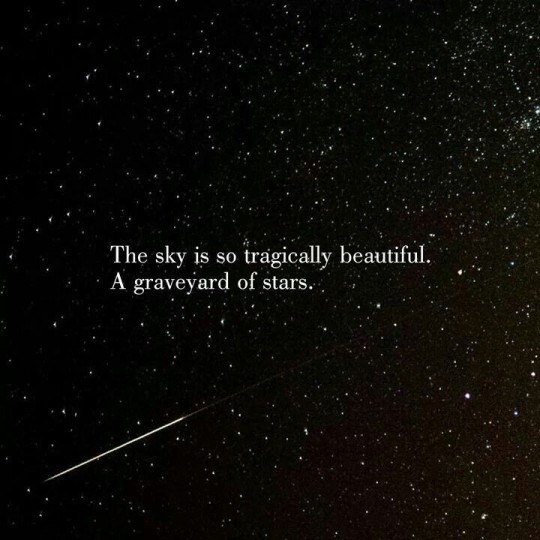
Saturn in first house
Saturn's presence here can make the individual serious, disciplined, and responsible. They may appear mature beyond their years, with a reserved demeanor. They might have a lean or bony physical structure. Individuals with Saturn in the first house may struggle with self-esteem or self-worth issues. They might feel a sense of inadequacy or pressure to meet high standards, both internally and externally imposed. Saturn's influence can affect the health, particularly the skeletal system, joints, teeth, and skin. These individuals may be prone to ailments like arthritis, dental issues, or skin problems. However, with proper discipline and care, they can maintain good health. Saturn's placement here can bestow a strong sense of ambition and determination. They are willing to work hard and endure challenges to achieve their goals. However, they may also face delays or obstacles along the way, which teach them patience and resilience. Saturn in the first house can indicate a cautious approach to relationships. These individuals may take their time to trust others and establish deep connections. They seek stability and commitment in partnerships but may struggle with expressing emotions openly. These individuals are often drawn to professions that require discipline, responsibility, and long-term planning. They may excel in fields such as management, law, engineering, or politics. However, they may face challenges or delays in their career progression, which require perseverance to overcome. Saturn's influence here can also lead to a deep introspective nature and a quest for spiritual understanding. These individuals may seek meaning and purpose in life through self-discipline, meditation, or religious practices.
Saturn in second house
Saturn in the second house often indicates a serious approach towards finances. It can bring financial stability through hard work, discipline, and long-term planning. However, there may also be delays or obstacles in financial matters, teaching the individual important lessons about managing resources wisely. Saturn here instills a strong sense of values and principles related to money, possessions, and personal worth. The individual may place great importance on security, frugality, and practicality in their approach to wealth accumulation. This placement can sometimes create tension or responsibilities within the family regarding financial matters. There may be a sense of duty towards family members, especially in providing financial support or taking care of elderly relatives. Saturn's influence can lead to cautious or reserved communication, especially regarding matters related to money and possessions. The individual may be careful with their words and prefer to speak only when necessary. Individuals with Saturn in the second house may struggle with feelings of inadequacy or low self-esteem, particularly in relation to their financial status or abilities. However, with effort and perseverance, they can gradually build a stronger sense of self-worth and confidence. While Saturn's influence may initially manifest as limitations or obstacles, it also rewards diligent effort and persistence. Over time, the individual can achieve material success and financial security through disciplined work and responsible management of resources. There may be a tendency to be conservative or cautious with money, preferring safe and stable investments over risky ventures. This approach can lead to slow but steady growth in wealth over time. Saturn in the second house often indicates karmic lessons related to finances, values, and self-reliance. The individual may need to confront and overcome challenges in these areas to fulfill their soul's evolutionary journey.
Saturn in third house
The third house represents communication, siblings, courage, and self-expression. Saturn here can indicate challenges or delays in communication. It may suggest a reserved or serious demeanor in speech. Relationships with siblings may be characterized by responsibility, duty, or even distance. Saturn in the third house enhances determination and discipline in communication and intellectual pursuits. Individuals may have a structured approach to learning and may excel in subjects that require focus and perseverance, such as mathematics or technical fields. Saturn's presence in the third house can bring obstacles and challenges in matters related to communication, short-distance travel, and interactions with neighbors or relatives. These challenges may serve as opportunities for personal growth and maturity, but they can also lead to feelings of frustration or limitation. Individuals with Saturn in the third house tend to have a practical and realistic approach to life. They may be cautious in their decision-making and prefer to rely on logic rather than intuition. This placement encourages careful planning and attention to detail in all areas of life. Saturn's placement in the third house can indicate a sense of responsibility towards siblings or younger relatives. These individuals may take on the role of a mentor or guide for their siblings, offering support and practical advice when needed. Saturn in the third house instills a strong work ethic and a willingness to put in the necessary effort to achieve one's goals. Individuals with this placement are likely to be diligent and hardworking, especially in areas related to communication, writing, or teaching. Success and recognition may come later in life for individuals with Saturn in the third house. They may need to overcome various obstacles and challenges before achieving their goals, but the rewards are likely to be long-lasting and well-deserved.
Saturn in fourth house
Saturn's placement in the fourth house often brings a sense of responsibility and seriousness to matters related to home and family. It may indicate a person who takes their family duties seriously, perhaps even feeling burdened by familial obligations at times. Saturn's influence can lead to a more reserved and disciplined approach to emotions. Individuals with this placement may struggle with expressing their feelings openly and might prefer a structured or traditional approach to emotional matters. Saturn in the fourth house can indicate a strong focus on property, land, and real estate matters. It may suggest delays or challenges in acquiring or managing property, but with perseverance, individuals can achieve stability in this area. The influence of Saturn in the fourth house can reflect a significant influence from one or both parents, particularly the father. There may be a sense of authority or strictness associated with parental figures, shaping the individual's upbringing and values. This placement can bring a deep-seated need for security and stability, both externally in the home environment and internally within oneself. Individuals may work diligently to establish a solid foundation in life, striving for long-term security and comfort. Saturn's placement in the fourth house may indicate a propensity towards introspection and a serious approach to inner growth. Individuals may grapple with deep-seated fears or insecurities, but through self-discipline and perseverance, they can achieve profound psychological insights and personal transformation. There may be a strong attachment to cultural heritage, traditions, and ancestral roots with Saturn in the fourth house. Individuals may feel a sense of duty to preserve family customs and values, even in the face of modern challenges or societal changes. Saturn's presence in the fourth house can bring various challenges and lessons related to home, family, and emotional security. These challenges often serve as opportunities for growth and maturity, teaching individuals valuable lessons about resilience, responsibility, and self-reliance.
Saturn in fifth house
The 5th house governs creativity, self-expression, intelligence, education, and children. Saturn's presence here may indicate a disciplined approach to creativity and self-expression. These individuals may have a structured and methodical approach to artistic endeavors, preferring traditional or time-tested methods over impulsivity. They may excel in fields requiring deep concentration, such as research, writing, or technical subjects. Saturn's influence in the 5th house can bring a serious and studious attitude towards education. These individuals may value knowledge and learning deeply, often pursuing higher education or specialized training with dedication and perseverance. However, there may be delays or obstacles in academic pursuits, requiring patience and persistence to overcome. Saturn's presence in the 5th house may bring challenges and responsibilities related to children and parenthood. There may be delays or difficulties in conceiving children, or the individual may take a cautious and disciplined approach to parenting. They may instill a strong sense of discipline and responsibility in their children, emphasizing the importance of hard work and perseverance. In matters of romance and relationships, Saturn in the 5th house may indicate a reserved or cautious approach. These individuals may be selective and practical when it comes to matters of the heart, preferring stable and long-lasting relationships over fleeting passions. They may also experience delays or challenges in finding romantic fulfillment, requiring patience and perseverance in matters of love. The 5th house also governs speculative ventures, gambling, and risk-taking activities. With Saturn here, individuals may approach these areas with caution and conservatism. They are unlikely to take unnecessary risks and may prefer to invest time and effort in more secure and stable pursuits. However, if they do engage in speculative activities, they are likely to do so with careful planning and analysis.
Saturn in sixth house
The sixth house represents service, daily work routines, health, enemies, obstacles, and conflicts. With Saturn here, the native tends to take their responsibilities seriously and may excel in professions that involve service or helping others. They are likely to be hardworking, methodical, and dedicated to their duties. Saturn's presence in the sixth house can indicate a strong focus on health matters. The native may face health challenges or chronic conditions, but they have the resilience to overcome these obstacles through discipline and perseverance. It's essential for them to maintain a structured and disciplined approach to health and well-being. Saturn in the sixth house suggests that the individual may face challenges or delays in their work environment. They may encounter demanding bosses, bureaucratic hurdles, or a heavy workload. However, they have the patience and endurance to handle these challenges effectively and emerge stronger from them. The sixth house is also associated with enemies and conflicts. Saturn here indicates that the native may face opposition or conflicts in their life, but they have the ability to deal with adversaries with maturity, caution, and strategic planning. They prefer to resolve conflicts through diplomacy and negotiation rather than confrontation. Individuals with Saturn in the sixth house often find fulfillment in serving others or working in fields that contribute to the well-being of society. They may excel in professions such as healthcare, social work, counseling, or public service where their disciplined approach and sense of duty can make a significant impact. Saturn's placement in the sixth house suggests that the native is working through karmic lessons related to service, responsibility, and overcoming obstacles. They may need to learn the value of self-discipline, humility, and perseverance in their journey towards personal growth and fulfillment.
Saturn in seventh house
Saturn in the seventh house often brings a sense of responsibility, seriousness, and maturity to relationships. It can indicate delays or obstacles in finding a suitable partner or in the process of getting married. However, once committed, individuals with this placement tend to take their partnerships very seriously and may prioritize stability and longevity over passion. Individuals with Saturn in the seventh house may feel a strong sense of duty and obligation towards their partners. They are likely to approach relationships with caution and practicality, preferring to establish a solid foundation before fully committing. Saturn's presence in the seventh house can bring challenges and lessons in the realm of partnerships. These challenges may include issues related to commitment, communication, or power dynamics within relationships. However, overcoming these challenges can lead to personal growth and maturity. This placement can also indicate success in business partnerships, particularly those that involve long-term planning, discipline, and hard work. Individuals with Saturn in the seventh house may excel in professions that require negotiation, diplomacy, and strategic thinking. Saturn in the seventh house often indicates karmic lessons and connections in relationships. Past life karma may play a significant role in the dynamics of partnerships, with lessons related to duty, responsibility, and mutual support. Depending on other factors in the birth chart, Saturn in the seventh house can sometimes indicate delays or obstacles in marriage. However, these delays are often temporary and can be overcome with patience, perseverance, and maturity. Despite the challenges, individuals with this placement are likely to have long-lasting and stable relationships. They have the ability to weather storms and overcome obstacles through their patience, perseverance, and commitment to their partners.
Saturn in the eighth house
Saturn in the eighth house often indicates a life marked by profound transformations and significant changes. These changes may be intense and may occur suddenly or through challenging circumstances. The individual may undergo various upheavals and experiences that lead to inner growth and evolution. This placement suggests a deep, intense, and introspective nature. The individual is likely to explore the depths of their own psyche and may have a keen interest in esoteric subjects, mysteries, and occult phenomena. They may possess a penetrating insight into the hidden aspects of life and may be drawn to explore taboo subjects or unconventional practices. Saturn in the eighth house can also indicate concerns or challenges related to inheritance, joint finances, or legacies. There may be obstacles or delays in matters pertaining to shared resources, taxes, insurance, or inheritances from others. However, with patience and perseverance, the individual can navigate these challenges and eventually establish a stable foundation in these areas. Individuals with this placement often develop a strong sense of psychological resilience and inner strength. They have the capacity to endure adversity and hardship, emerging from difficult situations with newfound wisdom and maturity. Saturn's influence in the eighth house instills a sense of discipline, responsibility, and determination, which enables the individual to confront life's challenges with courage and fortitude. Saturn's placement in the eighth house can also signify a profound spiritual journey characterized by deep introspection, inner purification, and spiritual transformation. The individual may be drawn to spiritual practices such as meditation, yoga, or metaphysical studies, seeking to unravel the mysteries of existence and attain higher states of consciousness. Saturn in the eighth house may indicate a karmic reckoning, where past actions and debts come to the forefront for resolution. The individual may be confronted with karmic lessons related to power dynamics, trust, betrayal, and emotional intimacy. Through facing these challenges head-on, they have the opportunity to transcend limitations and evolve spiritually.
Saturn in ninth house
Saturn in the ninth house suggests a deep-seated interest in spirituality, religion, and philosophy. The individual may have a strong sense of duty and responsibility towards understanding the deeper meaning of life and may embark on a quest for spiritual truth. These individuals tend to have a serious and philosophical outlook on life. They may be drawn to ancient wisdom, traditional teachings, and may seek guidance from spiritual gurus or mentors. Saturn's presence can bring challenges and delays in higher education. The individual may face obstacles in academic pursuits or may have to work harder to achieve academic success. However, perseverance and dedication can lead to eventual success. Saturn in the ninth house often indicates that wisdom and knowledge are acquired through life's experiences and hardships. The individual may have to overcome various trials and tribulations to gain profound insights and understanding. These individuals may hold conservative or traditional beliefs, and they may be resistant to change. They prefer stability and security in their philosophical and religious beliefs, often adhering to age-old traditions and customs. Saturn here can indicate limitations or restrictions in long-distance travel. It may require careful planning and organization, and there may be delays or obstacles during journeys. However, travel undertaken with a purpose, such as for educational or spiritual purposes, can be beneficial. The relationship with the father may be characterized by seriousness, discipline, or distance. The father may play a significant role in shaping the individual's philosophical and moral values, but there could also be challenges or responsibilities associated with this relationship. Despite the challenges posed by Saturn, individuals with this placement can achieve success and fortune through discipline, hard work, and perseverance. They are capable of building a solid foundation for their future, especially in fields related to law, spirituality, teaching, or philosophy.
Saturn in tenth house
Saturn in the tenth house imbues the individual with a strong sense of responsibility, discipline, and perseverance in their professional endeavors. They are likely to take their career seriously and understand the importance of hard work and commitment. Individuals with Saturn in the tenth house are often career-oriented and may prioritize their professional goals above other aspects of life. They are willing to put in the necessary effort and sacrifice to achieve success in their chosen field. Saturn's placement here may grant the individual leadership qualities and the ability to handle positions of authority with maturity and wisdom. They may excel in managerial roles or positions that require them to take charge and make important decisions. While Saturn brings stability and structure, its placement in the tenth house can also indicate challenges and obstacles in the individual's career path. They may face delays, setbacks, or struggles in achieving their goals, but these experiences ultimately serve to strengthen their character and resilience. Saturn in the tenth house can influence the individual's public image and reputation. They may be perceived as reliable, competent, and respected by their peers and superiors. However, they may also be cautious about how they present themselves to the world, striving to maintain a professional and dignified demeanor. Individuals with this placement may have a traditional approach to their career and may prefer established, conventional paths rather than taking risks or exploring unconventional options. They value stability and security in their professional life. Saturn in the tenth house encourages the individual to focus on long-term goals and legacy-building. They may have a strong sense of duty towards leaving a lasting impact in their field or making meaningful contributions to society. In Vedic astrology, Saturn is also associated with the father. Its placement in the tenth house can indicate a significant influence or involvement of the father in the individual's career path and professional development.
Saturn in the eleventh house
Saturn's presence here can indicate that the native takes their friendships seriously and may have a small but close-knit circle of friends. These friendships may endure for a long time but could also involve responsibilities or limitations. Saturn's influence in the eleventh house can lead to slow but steady growth in income and gains. However, there may be delays or obstacles in achieving financial goals. The native may need to work hard and demonstrate discipline and perseverance to attain financial stability. Individuals with Saturn in the eleventh house may have ambitious goals and aspirations. They are likely to be cautious and practical in pursuing their dreams, preferring to plan meticulously and work methodically towards their objectives. Saturn's placement here often emphasizes social responsibility. The native may be involved in community or humanitarian efforts, driven by a sense of duty towards society. They may also encounter challenges or obstacles in achieving their social or collective goals. Saturn's presence can make the native cautious in forming new associations or joining groups. They may prefer quality over quantity in their social networks and may be selective about the causes or organizations they align themselves with. Individuals with Saturn in the eleventh house tend to have a long-term perspective on life. They are strategic in their approach and may invest time and effort in endeavors that promise long-lasting results, even if the rewards are delayed. Saturn's placement in any house brings karmic lessons, and in the eleventh house, these lessons often revolve around detachment, discipline, and responsibility within social and group dynamics. The native may need to learn to balance their individual aspirations with their obligations towards others.
Saturn in the twelfth house
Saturn in the twelfth house often indicates a deep interest in spirituality and introspection. These individuals may be drawn to meditation, yoga, or other spiritual practices as a means of seeking inner peace and understanding. There may be periods of isolation or a sense of being excluded from mainstream society. This placement can indicate a preference for solitude or a need to withdraw from the hustle and bustle of the external world. Saturn in the twelfth house can suggest a strong sense of duty towards serving others or making sacrifices for the greater good. These individuals may find fulfillment through acts of charity, service-oriented professions, or involvement in humanitarian causes. The twelfth house is often associated with karmic debts and past life experiences. Saturn's presence here may indicate a need to confront and resolve unresolved karmic issues or to fulfill duties left unfinished from previous lifetimes. Individuals with this placement may face obstacles and limitations in their life journey, particularly in matters related to the twelfth house themes such as spirituality, endings, and hidden enemies. However, these challenges can serve as opportunities for growth and self-discovery, as Saturn encourages perseverance and discipline. Saturn in the twelfth house can suggest connections or experiences with foreign lands, cultures, or people. These individuals may feel a strong affinity for foreign languages, travel, or living abroad. Despite the challenges posed by this placement, individuals with Saturn in the twelfth house often possess a profound inner strength and resilience. They have the ability to endure hardships and setbacks with patience and fortitude, ultimately emerging stronger and wiser from their experiences.
Masterlist



#saturn in the 7th house#saturn astrology#saturn#saturn in the 1st house#saturn in houses#astro notes#vedic astrology#astrology#vedic notes#venus astrology#astro observations#astro community#tarot deck#tarot readings#pick a card#tarot#astroblr
2K notes
·
View notes
Text
The Philosophy of Ontological Lateness
The philosophy of ontological lateness explores the concept that certain entities or phenomena come into existence or become fully realized only after the preconditions for their existence have been established. This idea can be interpreted in various contexts, such as metaphysics, epistemology, or even existentialism, reflecting on how and why certain aspects of reality or knowledge emerge only under specific circumstances.
Key Concepts in Ontological Lateness
Existential Preconditions:
Ontological lateness suggests that for some entities or concepts to come into being, certain preconditions must first be met. This can relate to the development of complex organisms in biology, the emergence of consciousness in philosophy of mind, or the unfolding of historical events.
Temporal Sequencing:
The notion of lateness implies a temporal sequence where certain phenomena are necessarily preceded by other developments. For instance, advanced scientific theories often rely on foundational discoveries and earlier empirical observations.
Contingency and Necessity:
This philosophy examines the interplay between contingency (things that could have been otherwise) and necessity (things that must be the way they are). It looks at how contingent events and conditions give rise to necessary outcomes in the context of ontological emergence.
Evolutionary Perspectives:
In evolutionary biology, ontological lateness can be seen in the gradual emergence of complex life forms, where each stage of evolution depends on the prior development of simpler forms of life. This gradual process illustrates how complexity and advanced traits appear late in the evolutionary timeline.
Cultural and Historical Development:
Historically and culturally, certain ideas, technologies, and social structures emerge late, building on the foundations laid by previous generations. The Industrial Revolution, for example, was predicated on earlier scientific discoveries and economic conditions.
Examples and Applications
Philosophy of Mind:
Consciousness and higher cognitive functions can be seen as late ontological phenomena, emerging only after the development of complex nervous systems and advanced brains. This perspective highlights how mental states depend on prior physical and biological developments.
Scientific Theories:
Advanced scientific theories, such as quantum mechanics or general relativity, emerged only after significant prior developments in classical mechanics, mathematics, and experimental methods. These theories are ontologically late because they rely on a framework established by earlier discoveries.
Technological Innovations:
Many technological advancements, such as the internet or space travel, could only emerge after the development of fundamental technologies like electricity, telecommunications, and aerospace engineering.
Social and Political Structures:
Democratic political systems and modern legal frameworks are often seen as late ontological developments that depend on earlier societal changes, including the Enlightenment, revolutions, and the establishment of individual rights.
Implications of Ontological Lateness
Understanding Progress:
Ontological lateness provides a framework for understanding the progression of knowledge, technology, and social structures. It emphasizes the importance of foundational developments and the interconnectedness of various stages of progress.
Interdisciplinary Insights:
This philosophy encourages interdisciplinary insights by showing how developments in one field (e.g., biology, technology) rely on prior advancements in other fields. It highlights the cumulative nature of knowledge and progress.
Existential Reflection:
On a more existential level, ontological lateness invites reflection on the human condition, our place in the universe, and the unfolding of individual lives. It suggests that personal and collective growth is a process that builds on previous experiences and conditions.
The philosophy of ontological lateness delves into the nature of existence and emergence, exploring how and why certain entities and phenomena come into being only after specific preconditions are met. By examining the temporal sequencing, contingency, and necessity of ontological emergence, this philosophy provides valuable insights into the progression of knowledge, technology, social structures, and the human experience.
#philosophy#epistemology#knowledge#learning#education#chatgpt#metaphysics#ontology#Ontological Lateness#Philosophy Of Mind#Emergence#Temporal Sequencing#Evolutionary Biology#Cultura lDevelopment#Historical Progress#Scientific Theories#Technological Advancements#Existentialism#Philosophical Insights#Cumulative Knowledge
4 notes
·
View notes
Text
Hannibal writing a paper called "The Evolutionary Origins of Social Exclusions" will never not be a punch in the gut. Hannibal is in such denial about the impact of Mischas death on him. "Nothing happened to me, I happened." I'm sure he finds so much comfort in the idea that the way he is is simply a natural progression of evolution. He has a flourishing social life, but he is always excluded in a way, never seen or understood. It must be so much easier to think that he's alone because he's naturally superior, more evolutionarily evolved than everyone else, then to consider the fact that he's just broken. Being a product of evolution surely feels better than being a product of trauma. It's easier to blame biology than environment and circumstance. One of them is someone's fault, and one of them is natural.
#hannibal#nbc hannibal#hannibal lecter#will graham#hannibal nbc#hannigram#hannibal and will#hannibal headcanons#hannibal analysis
166 notes
·
View notes
Text
Chekhov Reads Dungeon Meshi: CH49
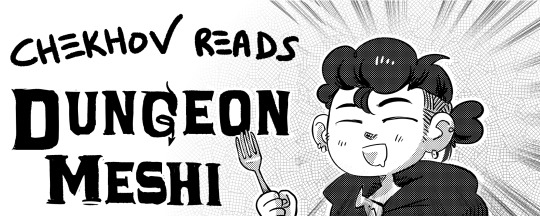
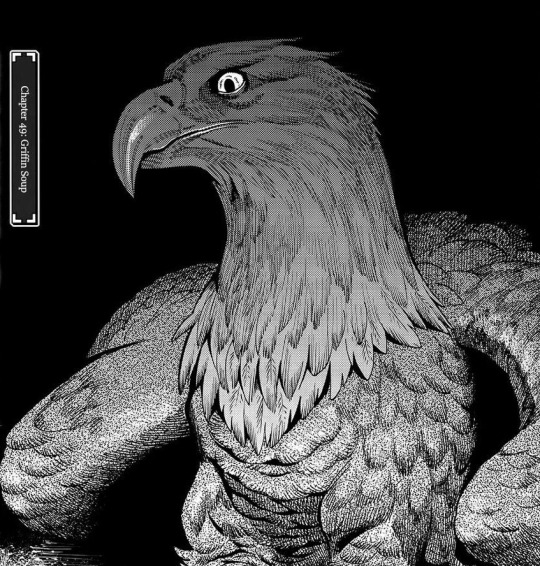
Mmmmmbig chicken.

It's not non-sense, it's common-sense. But dang, orcs really have that toxic adventuring gender stuff down, huh.

Dwarves are comprised of many basic shapes, such as...... cube....and.......two circle.....

.....It's..........TURNING into a dungeon.
Like an architectural structure has a natural evolutionary progression, including, apparently, becoming a dungeon if enough magic leaks into it? This is fascinating. Like magical radiation that poisons the natural architecture and creates monsters. That's fucked up.
But I need to know more immediately.
Though wait, I think Marcille's flashback chapters talked about creating and maintaining dungeons so it MUST be a well understood phenomenon.
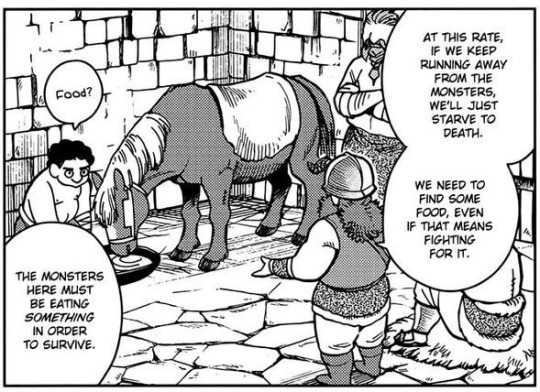
It's a small detail, but the group having a horse (pony?) with them and Senshi later getting attached to a horse-like monster feels extremely intentional. I wonder if it'll be explicitly mentioned or if I'm just reading too much into things.

......Anne was the name of the Kelpie. :( That's 100% of purpose. Oh no. Why do you do this to me.
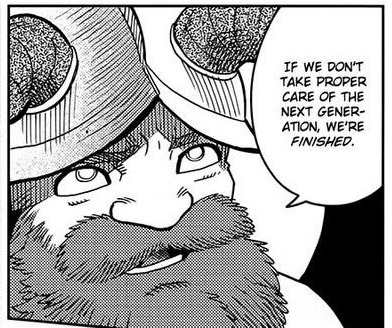
....aaaand that's where Senshi's strong parental instincts kick in.

................................ damn, poor kid.
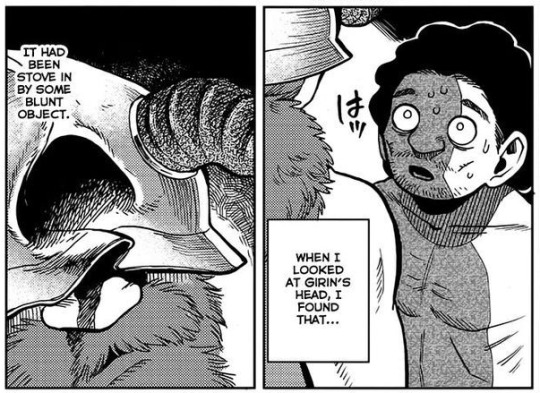
Dwarves are tough. A part of me wonders if that guy was hanging on to whatever life he had left, just barely making it through to feed Senshi........ A walking corpse, by all other names, hanging on for the sake of it.

It's really cool to see Senshi grow so much in the span of a few panels. And the orcs softening up is such a common theme it's not even surprising.

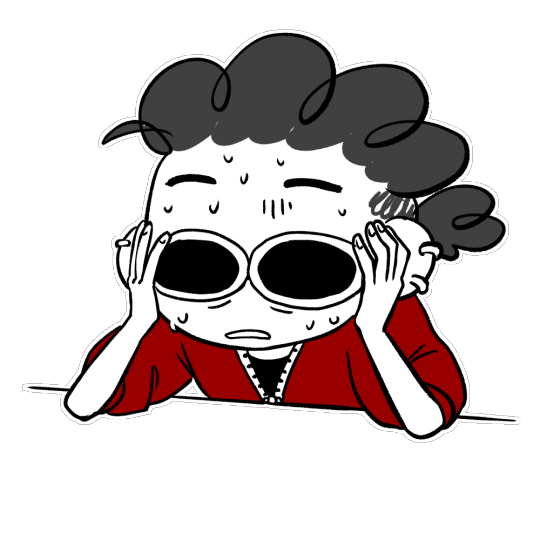
Oh.
OH.
Oh no.
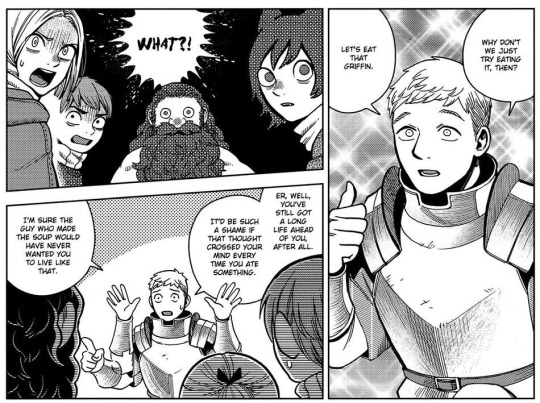
He's a fucking idiot but it's like. Healing? How stupid he is.
It's a level of not giving a fuck that you can aspire to.
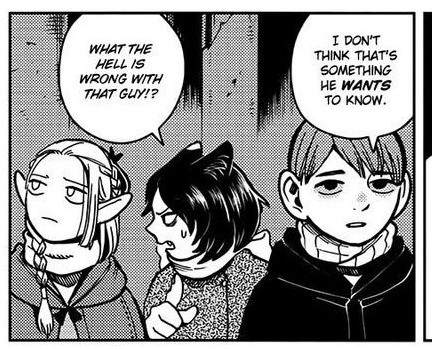
Marcille like "let me see if I can get you an itemized list....."

Laios pls.
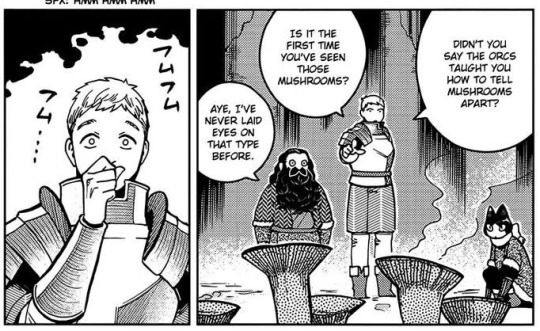
This boy is Sherlocking the fuck out of SOMETHING but I can't tell what.

Laios is an unstoppable force. He does not give a fuck.
But also. Hippogriff?
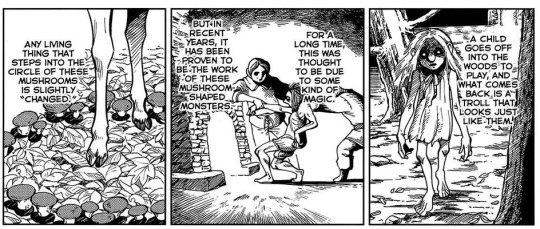
You're telling me a shroom mushed this Hippogriffin?
Okay, but seriously. "Step into the magic mushroom circle to clip through the floor and break your model by downloading a new unapproved mod" sounds JUST like something the dungeon would have.

well hey! The kick had a reasoning behind it!

humans: we wanna unlock the secrets of genome editing!
Mushroom CRISPR:


okay why is this genuinely getting to me.

(;´༎ຶД༎ຶ`)
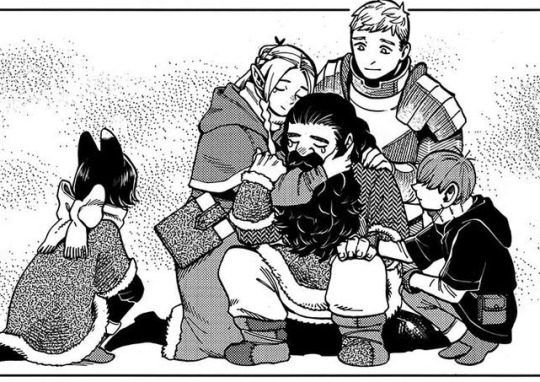
Bro. I love them.

AAAAA NOT THROUGH THE GENE EDITING CIRCLE
476 notes
·
View notes
Text
Fursuit noses getting damaged by people booping them with cameras led to progressively more reinforced noses, and has now culminated in fursuit noses becoming so rugged they can damage camera lenses
This feels like a demonstration of evolutionary pressure
1K notes
·
View notes